Children in Indian-controlled Kashmir are no strangers to lockdowns. Curfews, strikes and school shutdowns are all part of growing up in one of the world’s most militarized zones.
So when schools in the disputed region reopened after six months in late February, 9-year-old Jannat Tariq was overjoyed to see her friends and teachers.
She had spent months under a strict lockdown that began in August 2019, when India scrapped the region’s semi-autonomous status, closed schools and colleges, and imposed harsh curbs on civil rights and communications, including a shutdown of the internet.
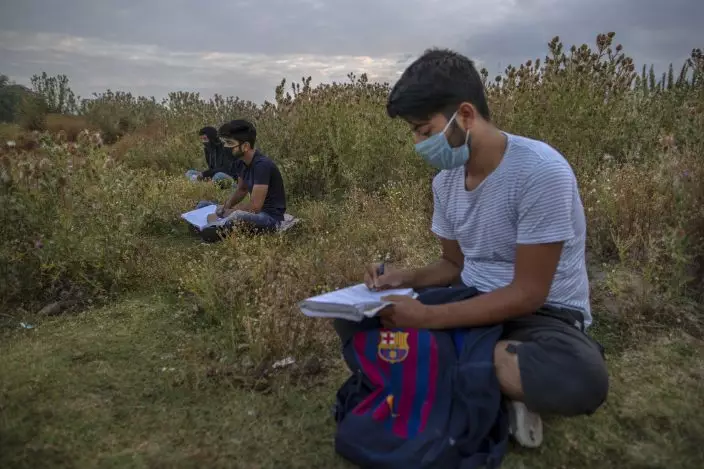
Kashmiri students attend an open-air early morning classes inside Eidgah or ground reserved for Eid prayers in Srinagar, Indian controlled Kashmir, Friday, July 18, 2020. When months went by without teaching, Muneer Alam, an engineer-turned-math teacher, started the informal community school in the form of an open-air classroom in June. Schools in the disputed region reopened after six months in late February, after a strict lockdown that began in August 2019, when India scrapped the region’s semi-autonomous status. In March schools were shut again because of the coronavirus pandemic. (AP PhotoDar Yasin)
In February, it finally was time to return to formal schooling. But Jannat’s happiness was short-lived.
The following month, she was once again forbidden to go to school, but for a completely different reason: the coronavirus pandemic.
Decades of insurgency, protests and military crackdowns have constantly disrupted formal schooling in Indian-administered Kashmir, where rebels have fought for decades for independence or unification with Pakistan, which controls the other part of the Muslim-majority region. A generation of students have seen their education upended, and empty classrooms are a familiar sight.
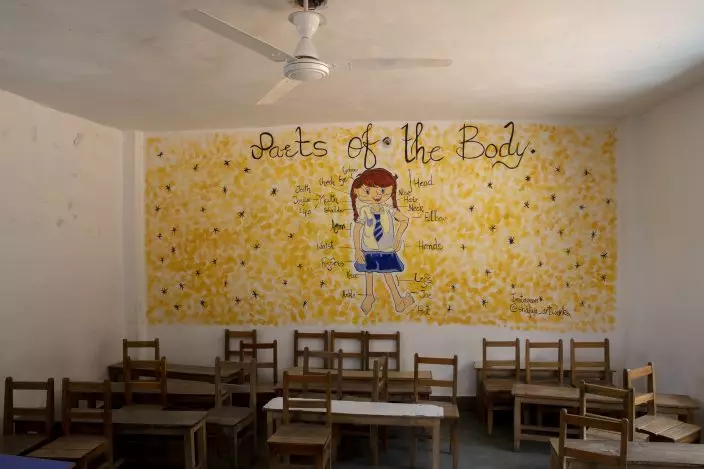
Chairs and benches lie inside an empty classroom of a private school that has remained closed for the past four months because of the coronavirus pandemic in Srinagar, Indian controlled Kashmir, Wednesday, July 22, 2020. Decades of insurgency, protests and military crackdowns have constantly disrupted formal schooling in Indian-administered Kashmir, where rebels have fought for decades for independence or unification with Pakistan, which controls the other part of the Muslim-majority region. A generation of students have seen their education upended, and empty classrooms are a familiar sight. (AP PhotoDar Yasin)
Over the years, volunteer-run community schools and makeshift classrooms have emerged to fill the gap when formal schools shut down, but large-scale troop deployments and restrictions on public movement mean they reach only a small proportion of students.
Now, the coronavirus lockdown is amplifying the problem.
Experts say lack of formal schooling during the lockdown could have a serious psychological and emotional impact on the children. With no opportunity to be with friends, many homebound students are struggling to reimagine the school experience as parents take over the role of teachers.
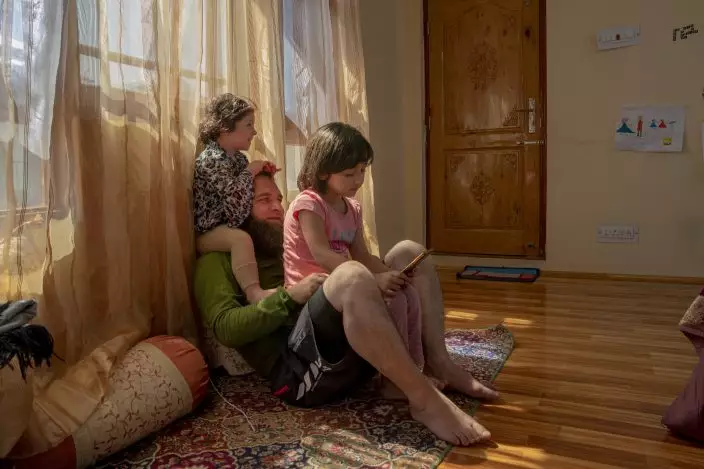
Khalid Bazaz plays with his niece Sundas Irfan, as his daughter Maria Khalid sits on his lap and watches online classes, at their home in Srinagar, Indian controlled Kashmir, Thursday, July 23, 2020. Confined to their homes, students have found it challenging to study online with the painstakingly slow internet connections, which also faces outages following the frequent gunbattles between rebels and Indian soldiers. With no high-speed internet, many educators are unable to upload video lectures and conduct online classes. But some are making the best of limited resources. "I have to spend 3 hours every day with Maria as she is too young to handle zoom meetings and like every child she is not interested in these online classes," Khalid said. (AP PhotoDar Yasin)
Like elsewhere in the world, online classes could have bridged that gap. But in Kashmir, it is a luxury students can’t afford.
A year after India’s sudden move to strip Kashmir's semi-autonomy, high-speed internet remains restricted in the region. India continues to defend the move by saying limited internet speed helps to head off anti-India protests that sometimes lead to clashes between demonstrators and Indian troops.
Confined to their homes, students have found it challenging to study online with the painstakingly slow internet connections, which also faces outages following the frequent gunbattles between rebels and Indian soldiers.
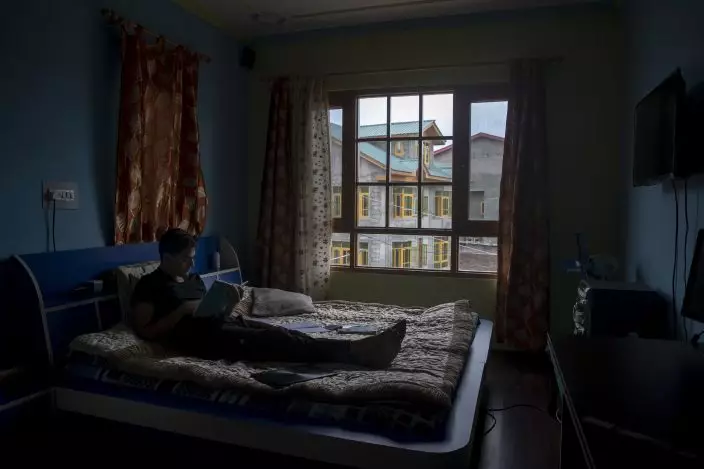
Humzah Mir studies inside his bedroom in Srinagar, Indian controlled Kashmir, Friday, July 17, 2020. Schools in the disputed region reopened after six months in late February, after a strict lockdown that began in August 2019, when India scrapped the region’s semi-autonomous status. In March schools were shut again because of the coronavirus pandemic. Humzah, who cleared his grade X exams a few days ago, says it will be a hard road ahead with no proper classes. (AP PhotoDar Yasin)
“We are not able to keep up with lessons online and we miss our regular school,” said 11-year-old Mohsin Shafi.
With no high-speed internet, many educators are unable to upload video lectures and conduct online classes. But some are making the best of limited resources.
When months went by without teaching, Muneer Alam, an engineer-turned-math teacher in Srinagar, the region’s main city, started an informal community school in June in the form of an open-air classroom.
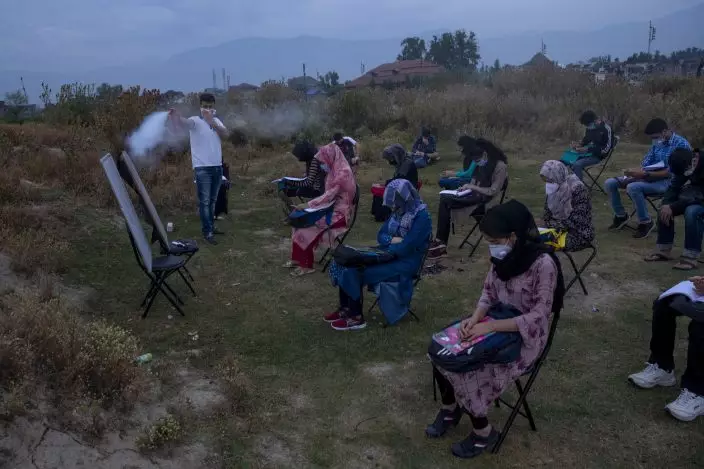
Muneer Alam, an engineer-turned-math teacher, sprays disinfectant before the start of an early morning outdoor class at Eidgah, a ground reserved for Eid prayers, in Srinagar, Indian controlled Kashmir, Friday, July 18, 2020. Alam said the driving force to start the open-air classes was seeing children all around him depressed and anxious. The open-air classroom buzzes with students. Some sit on chairs. Others place themselves on rugged mats or on the ground. Social distancing is maintained. (AP PhotoDar Yasin)
Alam said the driving force to start the open-air classes was seeing children all around him depressed and anxious.
It worked.
The open-air classroom buzzes with students. Some sit on chairs. Others place themselves on rugged mats or on the ground. Social distancing is maintained.
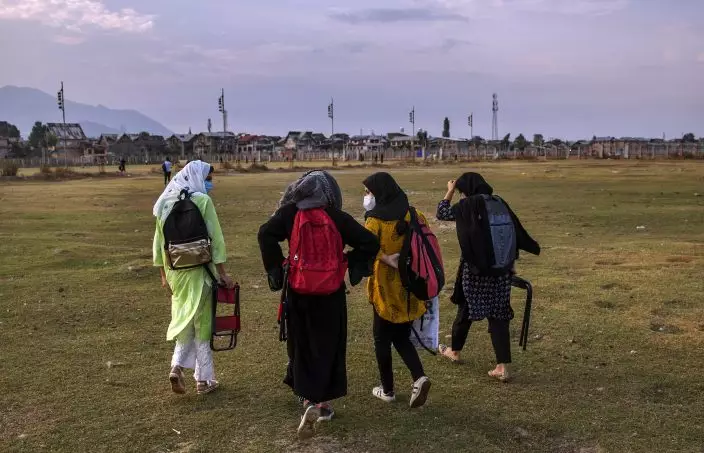
Kashmiri students walk homeward after attending an open-air class inside Eidgah, a ground reserved for Eid prayers, in Srinagar, Indian controlled Kashmir, Friday, July 31, 2020. When months went by without teaching, Muneer Alam, an engineer-turned-math teacher, started the informal community school in the form of an open-air classroom in June. Schools in the disputed region reopened after six months in late February, after a strict lockdown that began in August 2019, when India scrapped the region’s semi-autonomous status. In March schools were shut again because of the coronavirus pandemic. (AP PhotoDar Yasin)
“I wanted to give children an opportunity to attend a few classes with familiar faces around them,” Alam said.
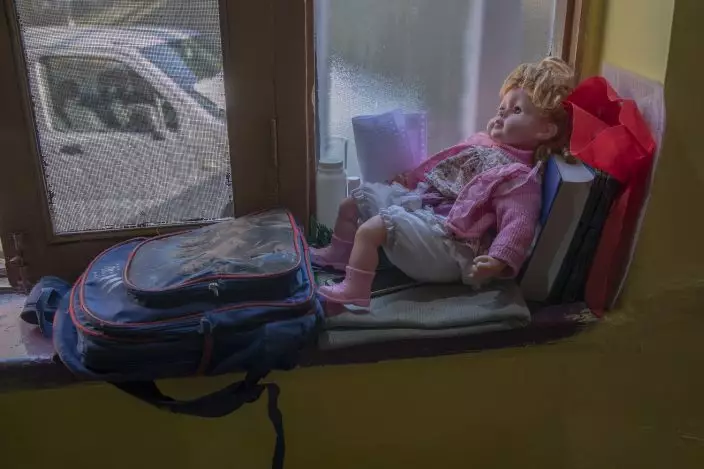
A school bag lies next to a doll belonging to a young Kashmiri student inside her home in Srinagar, Indian controlled Kashmir, Thursday, July 18, 2020. Decades of insurgency, protests and military crackdowns have constantly disrupted formal schooling in Indian-administered Kashmir, where rebels have fought for decades for independence or unification with Pakistan, which controls the other part of the Muslim-majority region. A generation of students have seen their education upended, and empty classrooms are a familiar sight. Now, the coronavirus lockdown is amplifying the problem. (AP PhotoDar Yasin)
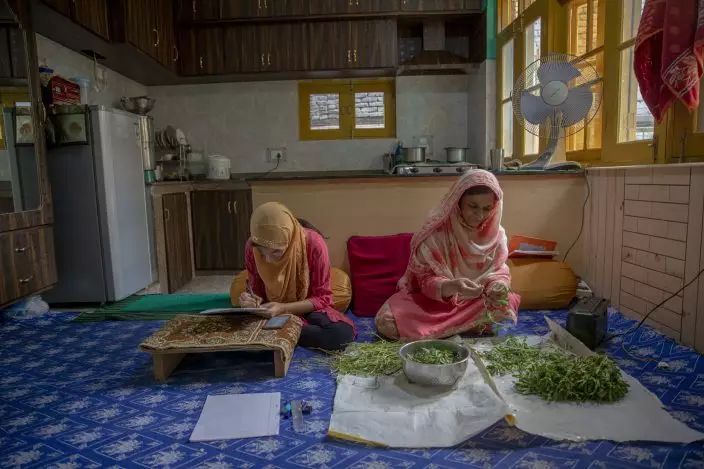
Kashmiri student Aaishya Imtiyaz writes her examination as her mother Nusrat Fatima cleans vegetables inside their kitchen in Srinagar, Indian controlled Kashmir, Wednesday, July 22, 2020. Experts say lack of formal schooling during the lockdown could have a serious psychological and emotional impact on the children. With no opportunity to be with friends, many homebound students are struggling to reimagine the school experience as parents take over the role of teachers. "This is my second exam at home since last year. I hope and pray that we go to school very soon," Aaishya said. (AP PhotoDar Yasin)
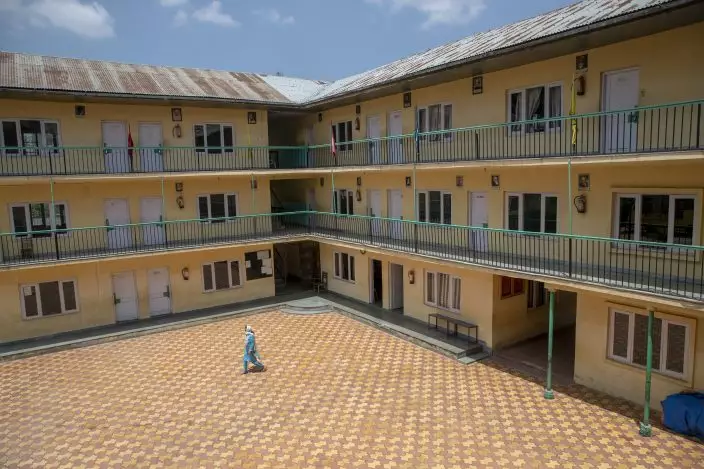
A woman walks inside an empty school that has remained closed for the past four months because of the coronavirus pandemic in Srinagar, Indian controlled Kashmir, Wednesday, July 22, 2020. Schools in the disputed region reopened after six months in late February, after a strict lockdown that began in August 2019, when India scrapped the region’s semi-autonomous status. In March schools were shut again because of the coronavirus pandemic. (AP Photo Dar Yasin)
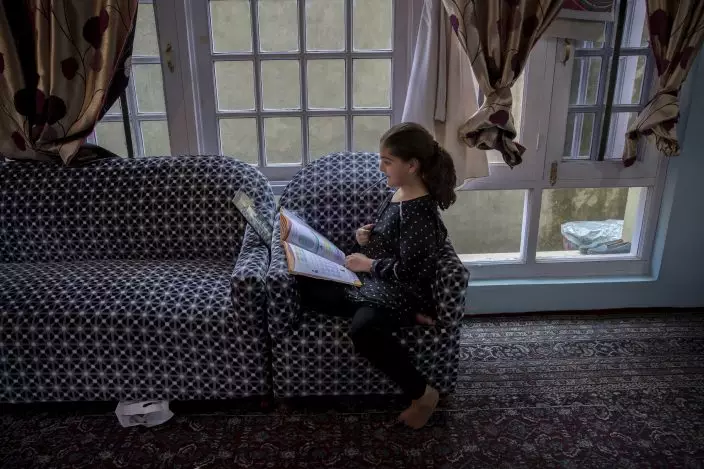
Jannat Tariq, 9, attends online classes inside her home in Srinagar, Indian controlled Kashmir, Wednesday, July 22, 2020. Children in this region are no strangers to lockdowns. Curfews, strikes and school shutdowns are all part of growing up in one of the world’s most militarized zones. So when schools in the disputed region reopened in late February, after six months of a strict lockdown that began in August 2019, Tariq was overjoyed to see her friends and teachers. But schools shut again the following month because of the coronavirus pandemic. (AP PhotoDar Yasin)
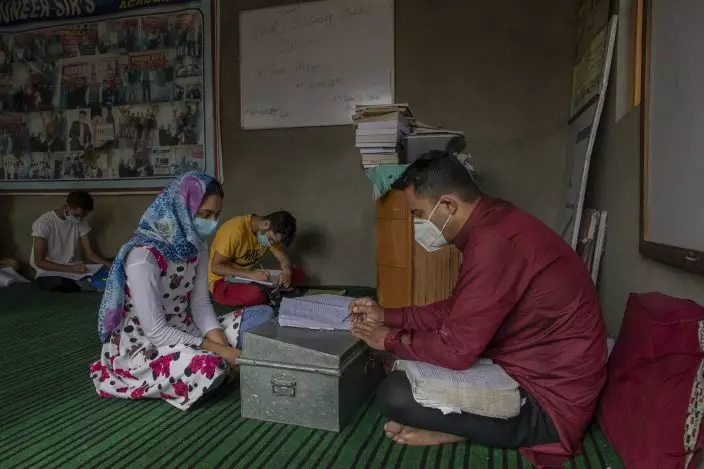
Iqra Nazir listens to her teacher Muneer Ahmed during a math coaching class in Srinagar, Indian controlled Kashmir, Wednesday, July 22, 2020. Decades of insurgency, protests and military crackdowns have constantly disrupted formal schooling in Indian-administered Kashmir, where rebels have fought for decades for independence or unification with Pakistan, which controls the other part of the Muslim-majority region. Over the years, volunteer-run community schools and makeshift classrooms have emerged to fill the gap when formal schools shut down, but large-scale troop deployments and restrictions on public movement mean they reach only a small proportion of students. (AP PhotoDar Yasin)
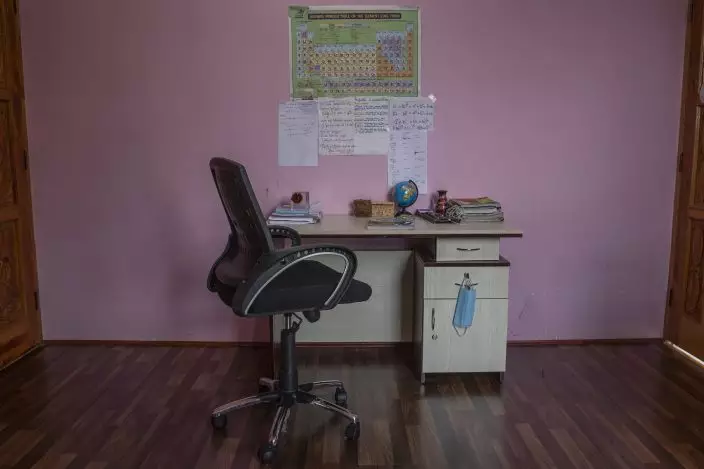
A face mask hangs on a study table of a Kashmiri student in Srinagar, Indian controlled Kashmir, Friday, July 18, 2020. Experts say lack of formal schooling during the lockdown could have a serious psychological and emotional impact on the children. With no opportunity to be with friends, many homebound students are struggling to reimagine the school experience as parents take over the role of teachers. (AP Photo Dar Yasin)
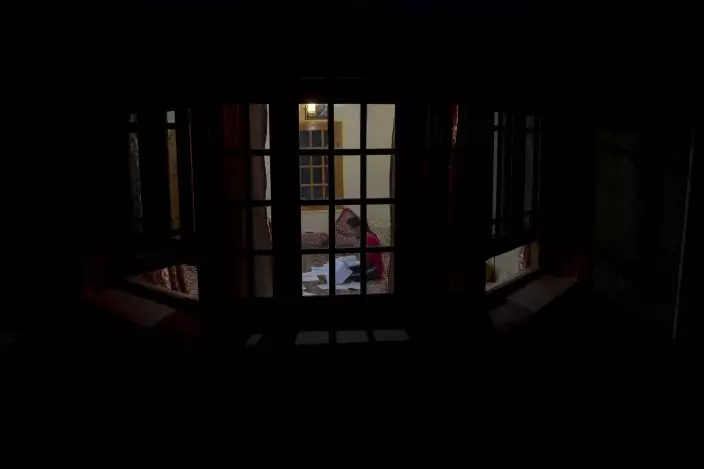
College student Raqeeba Jan, who had to return home to Kashmir because of the pandemic, studies inside her home in Srinagar, Indian controlled Kashmir, Thursday, July 23, 2020. A year after India’s sudden move to strip Kashmir's semi-autonomy, high-speed internet remains restricted in the region. India continues to defend the move by saying limited internet speed helps to head off anti-India protests that sometimes lead to clashes between demonstrators and Indian troops. Confined to their homes, students have found it challenging to study online with the painstakingly slow internet connections, which also faces outages following the frequent gunbattles between rebels and Indian soldiers. (AP Photo Dar Yasin)


